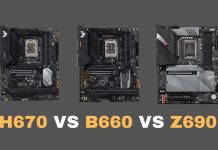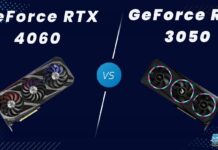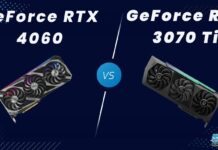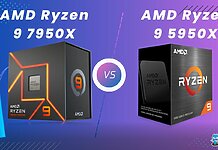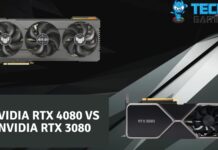Starting another test of the latest processors, we find ourselves at a crossroads, comparing Intel’s freshest entry, the Core i5-14600K, with its predecessor, the Core i5-13600K. This exploration dives into the performance of these CPUs and our dissection of the strengths and differences between these two Intel chips: Core i5-14600k vs Core i5-13600K.
Key Takeaways
- Our benchmarking of the performance of these processors leads to the Core i5-14600K leading the results with a 2.7% FPS advantage when compared to the Core i5-13600K.
- In addition, we also found the Core i5-13600K utilizes 5.9% less power to provide similar results to the Core i5-14600K, which could save some electricity for users.
- Furthermore, in terms of thermal efficiency, we saw the Core i5-14600K in the lead again, as it provides 2.8% better heat management capabilities to users when compared to the Core i5-13600K.
- Finally, taking a look at the pricing, we see the newer generation from Intel, the Core i5-14600K, being placed at a 6.5% higher price tag when compared to the last generation’s Core i5-13600K.
Comparison Table
| Feature | Core i5-14600K | Core i5-13600K |
|---|---|---|
| Architecture | Core i5 | Core i5 |
| Codename | Raptor Lake-R | Raptor Lake-S |
| CPU Socket | Intel Socket 1700 | Intel Socket 1700 |
| Unlocked for Overclocking | Yes | Yes |
| Max. Operating Temperature | 100°C | 100°C |
| PCIe Express Version | Gen 5 | Gen 5 |
| Memory Type & Speed | DDR4, Up to 3200 MHz DDR5, Up to 5600 MHz | DDR4, Up to 3200 MHz DDR5, Up to 5600 MHz |
| Release Date | Oct 17th, 2023 | Sep 27th, 2022 |
| Approximate Price | 319 USD | 308 USD |
| Best Motherboard | Best Motherboards For i5-14600K | BEST Motherboards For i5-13600K |
| Best Cooler | Best CPU Coolers For i5-14600K | BEST CPU Coolers For i5-13600K |
| Best GPU | Best GPU For Core i5-14600K | - |
Architectural Difference
- Process Node: Starting off, both the Core i5-14600K and Core i5-13600K are manufactured using the same 10nm Intel process node, highlighting similar production technology.
- Frequency: The Core i5-14600K features a 3.5 GHz Base frequency and can turbo boost up to 5.3 GHz, while the Core i5-13600K shares the same 3.5 GHz Base Frequency but offers a slightly lower Turbo Clock of up to 5.1 GHz.
- TDP: Moreover, both processors have a 125W TDP, indicating similar power consumption during gaming and other tasks.
- Cores & Threads: Both the Core i5-14600K and Core i5-13600K offer 14 cores and 20 threads, providing similar core and threading capabilities.
- Supported Technologies: Finally, both processors are equipped with UHD Graphics 770 as their integrated graphics solution, ensuring parallel graphics capabilities.
Gaming Benchmarks
Since we have dealt with all the respective specifications and disparities of both of the CPUs, we are now about to move on to the gaming benchmarks. In this test, we will be running ten different games at 1080p resolution to figure out how they perform in detail.
Test Bench
Below are the specs of the testing bench that we have used for this particular benchmarking:
- OS – Windows 11
- CPU Cooler – Cooler Master MasterLiquid Lite ML240L RGB
- Graphics Card – GIGABYTE RTX 4090 Gaming OC 24G
- SSD – XPG Gammix S70 Blade 2TB NVMe
- Power Supply – ENERMAX REVOLUTION D.F. X 1050W
- GPU – GIGABYTE RTX 3070 VISION OC
Learn: How To Benchmark Your Gaming PC
The Last Of Us Part I

- In our gaming tests of The Last Of Us Part I, the Core i5-13600K recorded 164 FPS, while the Core i5-14600K achieved 168 FPS, resulting in a 2.4% difference in the performance between these two processors.
- Moreover, our test reveals the Core i5-14600K exhibits a remarkable 20.3% advantage in 1% lows compared to the Core i5-13600K, with the Core i5-14600K recording 130 FPS vs 106 FPS.
Red Dead Redemption 2

- Throughout our benchmarking of Red Dead Redemption 2, the Core i5-13600K delivered 159 FPS, and the Core i5-14600K reached 162 FPS, showcasing a 1.8% difference between them.
- When analyzing 1% lows, we found the Core i5-14600K consistently outperforms its predecessor by achieving 132 FPS compared to 127 FPS drawn by the Core i5-13600K, demonstrating a 3.8% higher performance level.
Hitman 3

- Gaming performance leans in favour of the Core i5-14600K in our gameplay of Hitman 3, with 223 FPS on average, whereas the Core i5-13600K achieved 218 FPS, resulting in a 2.2% difference.
- We saw similar results when examining 1% lows, with the Core i5-14600K showing a 6.9% higher performance. The Core i5-13600K reached 138 FPS, whereas the Core i5-14600K achieved 148 FPS.
Spider-Man Miles Morales

- Again, our results show a similar picture in Spider-Man Miles Morales, as the Core i5-13600K reached 116 FPS, and the Core i5-14600K recorded 117 FPS, with a marginal 0.8% difference.
- Furthermore, the Core i5-14600K excels with 1% lows, showcasing 82 FPS on average, registering a 6.2% advantage over the Core i5-13600K, which gets 77 FPS on average, indicating smoother gaming experiences.
Cyberpunk 2077

- When it comes to checking the gaming prowess of these processors in Cyberpunk 2077, the Core i5-14600K maintains a 2.7% lead in average FPS over the Core i5-13600K, showcasing 112 FPS on average compared to 109 FPS.
- In our gaming assessments, the Core i5-14600K maintains a significant 9.8% lead in 1% lows. The Core i5-13600K achieved 77 FPS, while the Core i5-14600K reached 85 FPS.
Hogwarts Legacy

- Across our comprehensive testing of the Hogwarts Legacy, the Core i5-14600K consistently excelled with 72 FPS, surpassing the Core i5-13600K’s 68 FPS by a significant 5.7%.
- As we moved on to the next test, the Core i5-14600K 58 FPS, on average, consistently showcases a 3.5% advantage in 1% lows, ensuring more consistent gaming performance compared to 56 FPS on average.
Microsoft Flight Simulator

- Our testing in Microsoft Flight Simulator shows the Core i5-14600K establishes a 1% lead in average FPS over its counterpart, the Core i5-13600K, with an average of 97 FPS compared to 96 FPS, reaffirming its gaming capabilities.
- The Core i5-14600K establishes a 1.1% lead in 1% lows over the Core i5-13600K in our testings. Moreover, the Core i5-13600K reached 85 FPS, while the Core i5-14600K recorded 86 FPS.
Forza Horizon 5

- Gaming benchmarks consistently favour the Core i5-14600K in Forza Horizon 5 as it showed 211 FPS, showcasing a 2.3% higher average FPS compared to the Core i5-13600K’s 206 FPS.
- We saw a similar picture again, as the Core i5-14600K showcased a 3.9% higher performance level in 1% lows, ensuring smoother gameplay by achieving 181 FPS as compared to 174 FPS on average.
Starfield

- The Core i5-14600K maintains a robust 2.8% advantage in average FPS when pitted against the Core i5-13600K in Starfield. We noticed the former pulling 105 FPS on average while the latter got 102 FPS.
- We also examined the Core i5-14600K to deliver 84 FPS, which showcases a 2.4% advantage in 1% lows compared to the Core i5-13600K’s 82 FPS, enhancing gaming stability.
The Witcher 3

- Our gaming assessments in The Witcher 3 reveal that the Core i5-14600K excels with a 1% higher average FPS than the Core i5-13600K, drawing 95 FPS on average compared to 94 FPS, highlighting its superior gaming performance.
- Our benchmarking also showed that the Core i5-14600K excels with a remarkable 10.5% advantage in 1% lows, indicating its superior performance and smoother gaming experiences as it delivers 90 FPS as compared to 81 FPS.
Overall Gaming Performance

Since we are done collecting benchmark data on each of the games individually, the next step on the line is to examine the overall gaming performance of these processors on the basis of their average FPS and 1% lows in these gaming tests.
Going down to the details, we noticed the Core i5-14600K drawing 136.2 FPS on average, while the Core i5-13600K trails slightly behind with 133.2 FPS on average, creating a small difference of 2.2%.
In terms of 1% lows, we see similar results, with the Core i5-14600K leading with a 7% difference by drawing 107.6 FPS on average when pitted against the Core i5-13600K, which draws 100.3 FPS.
Here is a short video of the benchmarks we conducted on these processors.
Gaming Power Consumption
As we wrap up our gaming performance, our focus now shifts to examining the power efficiency of these processors. Our testing will provide insights into how these chips manage power aspects, a vital consideration for both gamers and performance enthusiasts.
Note: It’s worth mentioning that both of these CPUs share identical Thermal Design Power (TDP) ratings. The Core i5-13600K and the Core i5-14600K both sport a 125W TDP, which leads to no disparity in their power specifications on paper.
| Processors | Core i5-13600K (Watts) | Core i5-14600K (Watts) |
|---|---|---|
| Assassin's Creed Mirage | 96 | 103 |
| Hogwarts Legacy | 82 | 87 |
| Red Dead Redemption 2 | 65 | 77 |
| Cyberpunk 2077 | 90 | 94 |
| Hitman 3 | 96 | 99 |
| Microsoft Flight Simulator | 61 | 63 |
| Starfield | 60 | 58 |
| The Last of Us Part I | 74 | 79 |
| Spider-Man Miles Morales | 92 | 99 |
| Forza Horizon 5 | 72 | 77 |
While summing up the overall benchmarks of power consumption, we noticed the Core i5-13600K consistently outperformed the Core i5-14600K in power efficiency in most of the games we tested.
Furthermore, upon averaging these numbers, we examined the Core i5-13600K draws around 78.8W on average, while the Core i5-14600K draws slightly higher with 83.6W, leading to a difference of 5.9%.
Gaming Temperatures
Our next focal point is the gaming temperatures of these processors. It’s time to assess their thermal efficiency and observe how well they manage heat generation during intensive gaming scenarios.
| Processors | Core i5-13600K (°C) | Core i5-14600K (°C) |
|---|---|---|
| Assassin's Creed Mirage | 56 | 54 |
| Hogwarts Legacy | 52 | 51 |
| Red Dead Redemption 2 | 59 | 53 |
| Cyberpunk 2077 | 53 | 55 |
| Hitman 3 | 55 | 54 |
| Microsoft Flight Simulator | 49 | 47 |
| Starfield | 48 | 47 |
| The Last of Us Part I | 51 | 50 |
| Spider-Man Miles Morales | 56 | 54 |
| Forza Horizon 5 | 52 | 51 |
Contrary to power consumption, we saw a slightly different picture in temperatures, as the Core i5-14600K was seen exhibiting lower temperatures than the Core i5-13600K even though it was using more power on average.
In terms of numbers, the Core i5-13600K was seen drawing 53.1°C on average, while the Core i5-14600K showcases 2.8% better power efficiency by releasing 51.6°C on average.
Prices And Availability
During our research, we found the Core i5-14600K comes with an MSRP tag of 319 USD on platforms like Amazon, but this price could fluctuate, knowing it’s a new processor and a lot of people are trying to get their hands on it, which could affect its availability and supply as we have already seen it being sold for around 329 USD on Newegg at the moment.
On the other hand, the Core i5-13600K was seen being sold for around 308 USD on popular platforms like Newegg. Since it is a last-generation processor, it is more readily purchasable compared to its competition in this article.
When comparing both of these prices, we find a difference of 6.5% in pricing, with the Core i5-14600K being slightly more expensive than the Core i5-13600K. Therefore, we would recommend the users weigh all of the factors like current pricing, availability, and performance differences before making a decision.
Core i5-13600K Vs Core i5-14600K: Which One We Recommend?
Concluding our assessments, we can safely say the Core i5-14600K offers users a 2.2% better FPS performance and a 2.8% improved heat management compared to the Core i5-13600K.
Moreover, as per our research and results, we also saw the Core i5-13600K provides 5.9% better power efficiency and a 6.5% lower price tag as compared to the Core i5-14600K.
So, although the Core i5-13600K provides benefits in some areas, their results are so close that it doesn’t outclass the newer generation massively, which is also one of the reasons why we recommend the Core i5-14600K to our readers.
It was quite a tough decision to crown a victor between the two processors, but since the price difference is so minuscule, I would easily recommend everyone to go with the newest generation between the two, because not only it provides them better results but it is also future proof compared to the last gen.
– Shehryar Khan
Pros And Cons
| Core i5-13600K | Core i5-13600K | Core i5-14600K | Core i5-14600K |
|---|---|---|---|
| Pros | Cons | Pros | Cons |
| Compatibility with budget-friendly DDR4 motherboards. | Overclocking delivers less additional performance than anticipated. | Delivers robust performance within its class. | Tends to run hot, potentially necessitating additional cooling solutions. |
| Inclusion of integrated graphics catering to various usage scenarios. | Power consumption resembles that of higher-tier CPUs, akin to Core i7. | Equipped with capable integrated graphics, it adds versatility to its usage. | Limited to no significant performance improvements over the past generation. |
Thank you! Please share your positive feedback. 🔋
How could we improve this post? Please Help us. 😔
[Comparisons Expert]
Shehryar Khan, a seasoned PC hardware expert, brings over three years of extensive experience and a deep passion for the world of technology. With a love for building PCs and a genuine enthusiasm for exploring the latest advancements in components, his expertise shines through his work and dedication towards this field. Currently, Shehryar is rocking a custom loop setup for his built.
Get In Touch: shehryar@tech4gamers.com


 Threads
Threads